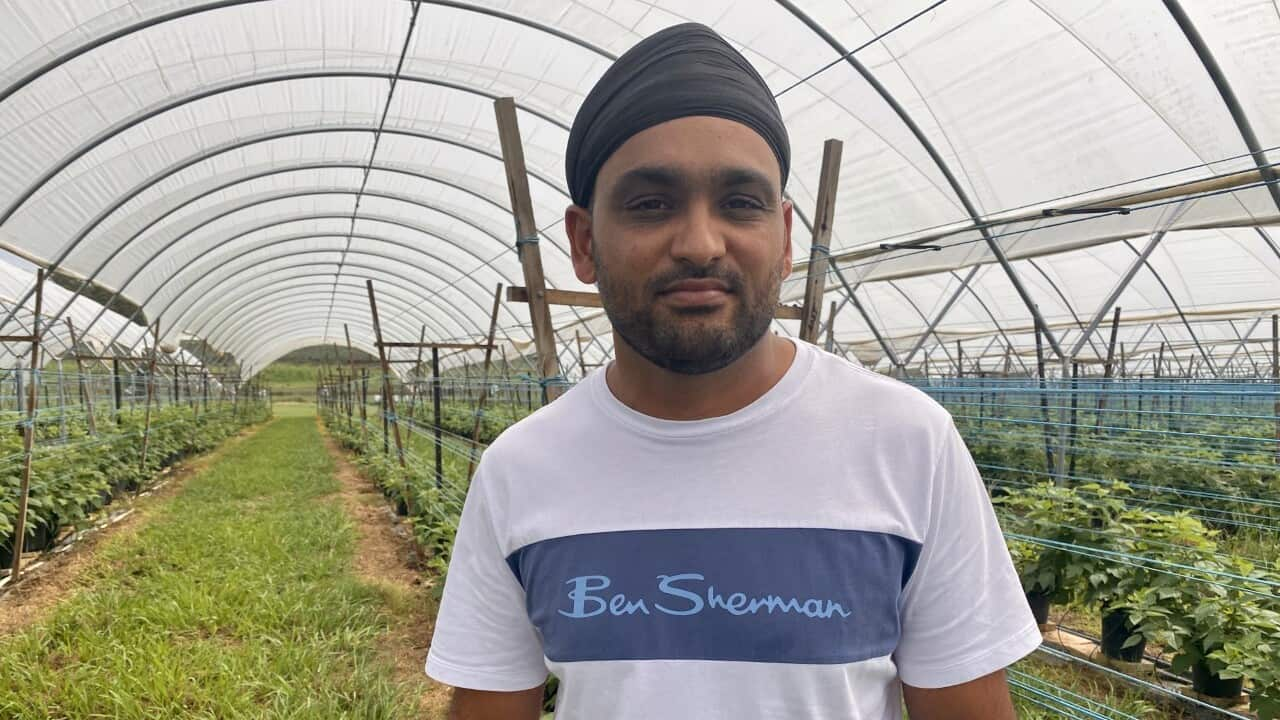Aman Lehl’s property in Corindi Beach, half an hour’s drive from Coffs Harbour, was completely dry just a fortnight ago.
The rain gauge at his berry farm has recorded 455 millimetres over the past week, boosting two empty dams to levels not seen since 2017.
“This rain that we’ve just had has completely filled up our dam. We’re back to 100 per cent storage. It’s amazing,” Mr Lehl told SBS News. Mr Lehl is one of almost 200 Sikh farming families based on the NSW mid-north coast.
Mr Lehl is one of almost 200 Sikh farming families based on the NSW mid-north coast.

Sikh blueberry grower Aman Lehl at his farm in Corindi Beach, NSW. Source: SBS News/Cassandra Bain
The area has long been known for its banana plantations and the iconic 'Big Banana' tourist attraction.
But Mr Lehl said competition from North Queensland growers forced him and other farmers in his area to diversify.
It's estimated the region now produces around 80 per cent of Australia’s blueberries.
“It allows us to grow all year round, but the last two years have been tough. We’ve experienced the worst weather in our living memory," Mr Lehl said. If it wasn’t for this week’s downpours, Mr Lehl said many of his berry crops wouldn’t have survived.
If it wasn’t for this week’s downpours, Mr Lehl said many of his berry crops wouldn’t have survived.

Dams at Aman Lehl's farm after and before the rain Source: SBS News/Cassandra Bain
He said he also would’ve been forced to truck in water and lay off staff.
“It’s a massive stress relief - it just gives us that certainty going forward now to plan our business and provide some security to our workers,” he said.
But a full recovery for local drought-affected macadamia growers could still be some time away, according to Coffs Harbour Nationals MP Gurmesh Singh, whose family has been farming in the area since the 1950s.
“For some farmers who have been impacted, it’ll take one year to catch up - macadamia trees might take between two to five years to catch up,” he told SBS News.
“For farmers out west, it might take a decade.” Mr Lehl said various NSW north coast farmers are looking to work together to drought-proof future seasons by improving water security measures.
Mr Lehl said various NSW north coast farmers are looking to work together to drought-proof future seasons by improving water security measures.

New South Wales Nationals MP Gurmesh Singh, who represents Coffs Harbour. Source: SBS News
He said many want to see changes to harvestable rights laws, which currently allow landholders in central and eastern NSW to capture just 10 per cent of average rainfall run-off from their properties.
“When you get this sort of event all this rain’s just going out to sea," Mr Lehl said.
"We need to be able to store this rain in the good times, and use this to get us through the dry times.”
The NSW government said a review into harvestable rights in coastal catchments will be released in the coming months.


